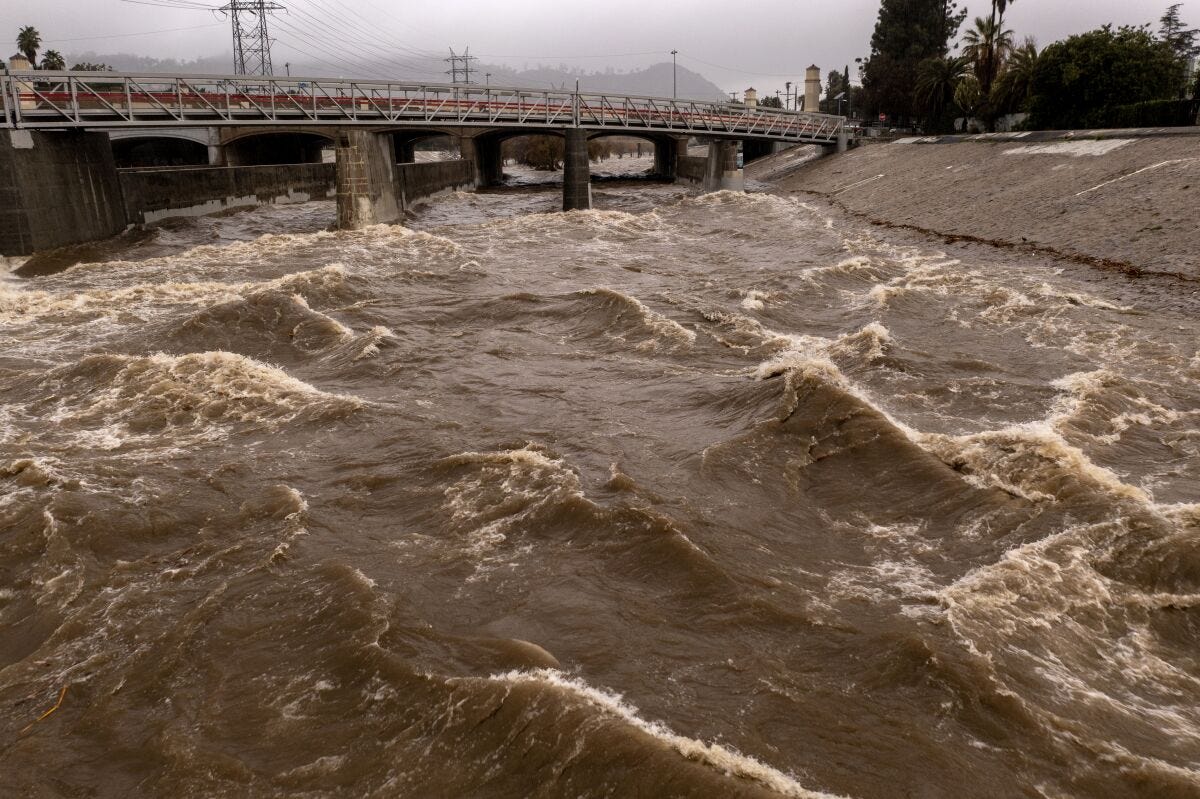Do Process
More bad weather on the way
Eli’s Coming
The month of perilous rain we got in LA seemed an appropriate teaser to 2023. This is going to be a rough year, the peak (I hope) of what’s been a difficult five years. In addition to everything we’ve been dealing with both before and after a global pandemic—continued repercussions of the 2019 agency campaign, studio mergers and buy-outs, the belt-tightening and increasing disposability of content by streamers—one thing that’s come up in every conversation I’ve had with writers these past few months is the upcoming WGA contract negotiation and the probability of a strike.
My entry to the business happened under somewhat similar, though less dire, circumstances. My writing partner and I made our first pilot sale—an “if/come” to Paramount Studios (meaning, we’d only get paid IF the show sold to a network, but the studio was putting their weight behind it)—in the summer of 2007. Our contract took three months to close. Three months and two days later, a writers’ strike began.
The strike precluded us from doing or soliciting any writing work. Because the script was already written, Paramount (and our reps at the time) elected to take the pitch out without us.
It was weird hearing that various cable networks had passed on our script when we didn’t even know it was being shopped. I have no doubt, now, that that experience set our career back several years.
What Can You Do?
I hope I’m wrong, but this isn’t the year you’re going to “break in.”1 It probably isn’t the year you get an agent or manager either. So, as writers who are either newly or not yet in the WGA, how should you spend your time during this uncertain year?
You can write.
If you start now, you can have a polished portfolio of sample scripts by December. If you’re looking to work in TV, I’d recommend having 3 original pilots, a spec of an existing show, and maybe one feature script too (as the lines are blurrier between media than they once were). If you want to write movies, write four feature scripts. That’s one per quarter! You can do that!

To that end, I’m going to try to make the next few newsletters craft- and process-focused.
Operating Systems
The first step in your writing process is to figure out what your process is. There is no one way to write, and most writers’ processes change and evolve: from project to project, as their lifestyles change, as they develop new skills or lose or pick up habits.
I think the key is consistency. Figure out a process that works for you and keep to it.
For the first part of his career, fan-favorite Writers Panel guest Jeff Greenstein (Friends; Will & Grace) wrote with a partner, Jeff Strauss. When Greenstein began writing on his own, “I had no idea what my discipline was. I didn’t know what time of day I was good. I didn’t know anything. Strauss and I, when we were writing together, we could write anywhere. We could write in a car, we could write in a noisy football stadium, it didn’t matter. I found when I started writing on my own, I needed total sensory deprivation.”
Greenstein turned an ADU behind his house into a writing studio to achieve this isolation. “It’s horrid, there’s no phone, there’s no internet connection, there’s nothing to do but write.”
Time of day plays a big factor for writers who are lucky enough to choose when they write. Greenstein says:
I learned that anything I do before 11am is shit. Anything. So I don’t start till 11. It took me a long time to figure this out, because I sit down, I’m on a deadline, I gotta start at 9 o’clock… and I’ll just have two hours of self-loathing. Two hours of self-loathing and then I’ll be more beat up and more exhausted when I actually start writing the good stuff at about 11:45.
Emily Cutler (AP Bio; Community) can’t write at night. “I am a total morning person. I like to be fresh. I don’t even want to eat breakfast.” She prefers the focus she gains by getting immediately to the work. Being on production deadlines has forced her to write at night when, she says, “your brain starts becoming fuzzy and you start hating yourself and telling yourself, You’re terrible, that’s why you can’t do any of this. But, really, you’re just tired and it’s late at night.”
Self loathing is a recurring theme when writers talk about their habits. But “not beating yourself up is a good thing to do,” Cutler says, which is sound advice for both writing and living. As far as process, she suggests that you “find your rhythms and where you work well.”
![THE DARK HALF [1993]: On Dual Format Now | Horror Cult Films THE DARK HALF [1993]: On Dual Format Now | Horror Cult Films](https://substackcdn.com/image/fetch/$s_!VXLG!,w_1456,c_limit,f_auto,q_auto:good,fl_progressive:steep/https%3A%2F%2Fsubstack-post-media.s3.amazonaws.com%2Fpublic%2Fimages%2F03750c05-9eb2-4e28-82ab-51c3dad4d149_480x328.jpeg)
It’s trial and error, for the most part. Some people write at home, others in offices, others like the white noise and visual distraction of a coffee shop.
Some writers set page goals or word count goals or set a timer and write for two, three, or four hours.
Sisyphus Gets It
Everyone agrees that the early parts of writing are the hardest. A great tip for getting through this stage, which Jeff Greenstein likens to “pushing a tractor up a hill,” is to write out of order.
It’s “a really fun way to go about things,” says Bridget Carpenter (11.22.63; Friday Night Lights). She suggests you write the scene you’re most excited about first. “What has to be there? What can’t I wait to write?” However, she says, “Sometimes you have to write an hour to realize that it’s 5 minutes of show that you’ve written.”
Cathryn Humphris (Mad Men; Under the Dome) reiterates that you shouldn’t beat yourself up. “The beginning is gonna be difficult,” she says. “I’m going to want to write five pages and I’ll get one page done. But then, somewhere toward the end, suddenly I’m up all night and I’ve written ten pages...”
I will add one thing. No matter what kind of schedule you keep yourself to, whether you write in isolation or alone-surrounded-by-others, take breaks and build some interaction into your day. You have to have human experiences! You can’t write in a bubble.
Noise Annoys
I love asking whether writers listen to music when they write. It’s one of those job-specific questions to which every writer has a passionate response. I remember reading an interview with Stephen King many years ago. He said he listens to hard, loud rock music when he writes—Metallica, Anthrax—all at top volume. He reportedly doesn’t do this any more and only listens to music when re-writing, but that has stuck with me as a terrifying way to write, that overwhelming of the senses. But, I suppose, that “wall of sound” that he creates becomes no different to the white noise of a coffee shop. He’s blocking out everything but the keyboard in front of him.
Alex Berger (Blindspot; The Mentalist), had some great advice about this. “Write to the same playlist every single day. The familiarity will induce a Pavlovian ‘time to write’ response.”
Of course, some writers want no part of it. Boardwalk Empire creator Terence Winter says, “I always face a wall when I’m writing. I don’t listen to music. I don’t look out the window. I have to just be alone in silence and really clear my mind of anything else. It just helps me focus.”
I loved chatting with Stephen King’s son, author Joe Hill (The Black Phone; NOS4A2), back in 2015. I asked Joe whether he listens to music when he writes. “I used to,” he said. “In recent years less and less, and never when I’m writing dialogue, because if I’m listening to music it’s like being at a concert and trying to talk to a friend; you can’t hear what the hell they’re saying. So you have to turn the music off to write dialogue. But if [the writing] is going good, and if I’m writing a scene of action or a largely descriptive scene, I’ll have a record on, usually like Beatles, Stones, Springsteen...”
The Zone
Ultimately, whatever your process, it’s all about getting out of your own head, or getting your brain into what I’ve always thought of as The Zone. Maybe it’s The Twilight Zone. Maybe it’s The Dead Zone. It’s that thing where your soul leaves your body and you’re just transcribing the scenes that you’re seeing or hearing. Your process is all just a way to shed those inhibitions or self-criticisms or the over-thinking that keeps us from writing at our most creative, inventive, and daring.
Community creator Dan Harmon describes it in his inimitable way:
You’re not the one doing the writing. There’s something else that wants to be written. There’s this thing that operates through us in these spontaneous moments of joy and creation that needs to be as enabled as possible. So you find whatever tricks you need to find to trick your personality into not being there at all.
This year, there’s going to be a lot of noise out there. A lot of distractions. Think of writing your four samples as going down to your cellar to weather this storm. All you need is a space, your brain, your passion, and something to write on. Ignore the rest.
Batten down the hatches.
Go Away
Are you looking for a fun way to access The Zone this summer? Ali Vingiano, who writes the terrific Little Things newsletter, is hosting a writing and yoga retreat in Greece from June 16-24.
This is Ali’s third in-person retreat, and she’s done a wonderful job combining her expertise in writing (she was on the staff of The Morning Show and has written and directed shorts and has articles in Buzzfeed, Vulture, and many more) with her passion for yoga and wellness. The retreat includes both writing and yoga workshops, private consultations, day trips, great meals, and more.
You can find all of the info for the Greece retreat here.
This retreat looks like a blast, and it has me thinking…
Should I do something like this? Would you be interested in going somewhere for a weekend or a week to focus solely on your writing? Get instruction from professional writers and eat good food and be with the community? Let me know what you think!
We’ll talk another time about how there isn’t just one instance of breaking in, either, but you get what I mean.








Thanks for linking to the Greece retreat, Ben! I am so excited for everything we have planned for that retreat. And thank you for the kind words about my newsletter too!
I love this post's perspective on process. Doing the work is always the only thing in our control. Might as well let go and focus on writing, this year or any other.
Yes! I’m not sure I can work out the Greece trip (but thinking about it!). Would love one from you that maybe I could make it to. Or maybe both 😃!